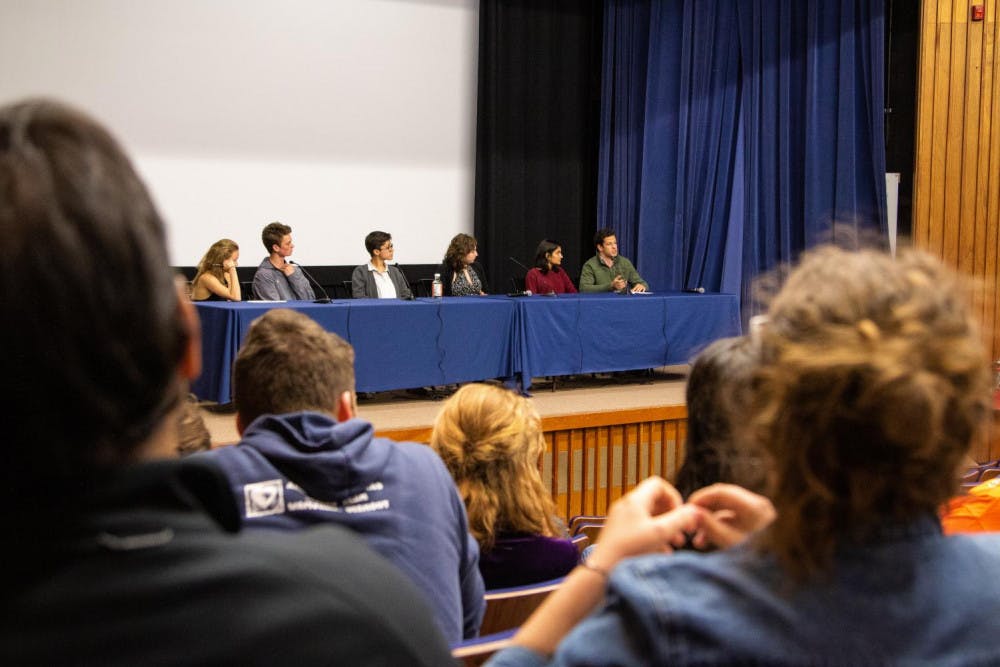On a busy Wednesday night, almost 100 people showed up to Dana Auditorium to listen to a panel of Middlebury College students talk about “Moving Forward” – how and why they each approached the visit of another controversial speaker, Ryszard Legutko, to our campus last week. With very little guidance, and with a talented student moderator, our students held a conversation that was impossible to have two years ago after Charles Murray’s visit. They disagreed pointedly at times, they tried to stick to the questions they were asked, and they created space for audience engagement.
A few people asked me after the event – what was the point? There was no consensus reached. No one on the panel changed their mind after 90 minutes. We did not design any new policies. We are still stuck in the place where we try to protect academic freedom and cultivate mutual respect.
What was the point? Just like every discussion section or seminar, the conversation was the point.
Consensus is not and should not be the goal. Among colleges and universities, Middlebury has made two choices, one older and one newer. Middlebury was founded in 1800 as a liberal arts college. A liberal arts education is based on the idea that the world can and should be understood in multiple ways. More recently, Middlebury has worked to create a more diverse and inclusive community. Education in a diverse community is based on the idea that the world is experienced in multiple ways. Consensus is anathema to a diverse, liberal arts education. We should not ask it of our students, nor of ourselves.
Is it ok if no one changed their minds? Of course it is – because education and persuasion do not happen in 90-minute increments. For some reason, we tell our students that they simply cannot learn the fundamentals of literary theory or international relations without meeting twice a week for three months, but when it comes to academic freedom or inclusion, we somehow expect to wrap it all up in a few Campus editorials or town hall meetings. We might hope to persuade our students, or each other, of the soundness of certain arguments, but persuasion does not happen at a distance – it happens in durable relationships between friends, between professors and students, among colleagues.
But we don’t have any new policies! For the past two years, we have convened committees, drafted new policies, and circulated emails. Some policy proposals can prompt useful conversations even if they do not come to fruition. Still, even the best policies are useless if not supported by the community.
We are still stuck in the place where we try to protect academic freedom and cultivate mutual respect. This is true. The recent episodes on our campus are symptoms of this, and we need to be explicit that this is the cause. Neither our Handbook nor the AAUP statement recognize an absolute right to academic freedom. On the other hand, our educational institution cannot avoid arguments we find objectionable. We are trying to figure out how to engage with a wide range of challenging ideas without hardening into hostile, competing camps.
The student-led conversation on Wednesday night was admirable in content and process. The students generally agreed that there was objectionable content in The Demon in Democracy, but disagreed over whether to attend the talk, not attend, protest, or sit with the author in class. They worked to share information, respond to myths (such as the idea that this was an “underground” talk by Legutko, or that what was planned was a “disruptive” protest), and draw lessons beyond this one event.
As an example of dialogue, the panel was public evidence that our students are both capable of and interested in respectful engagement with those with whom they disagree. They followed practices that helped facilitate understanding.
- Speak from experience, not on behalf of others: two students spoke about their roots and experiences outside the US (in Croatia and in India), and how those ties shaped their very different approaches to the talk.
- Listen to understand: several students asked clarifying questions rather than immediately challenging their peers.
- Take turns: no one student dominated the panel. There were a wide range of views represented, and the students took more or less equal time.
Our students are not perfect. Neither are we. On Wednesday night, I saw an informed and diverse group of students talk honestly and intelligently. In emails with students after the event, this thoughtful tone continued. One described a conversation with another panelist before it started, and both commented on “how rare it is to see people engaged in person.” Others said we needed to work to create “an atmosphere that encourages an exchange of ideas” and that they hoped “to organize similarly productive debates” in the future. Joey Lyons, Grace Vedock, Rebecca Duras, Akhila Roy, Ethan Cohen, and organizer and moderator Quinn Boyle – you have my thanks for showing us how we can confront our differences while treating each other with respect.
Sarah S. Stroup is an associate professor of Political Science and the faculty director of the Engaged Listening Project.



